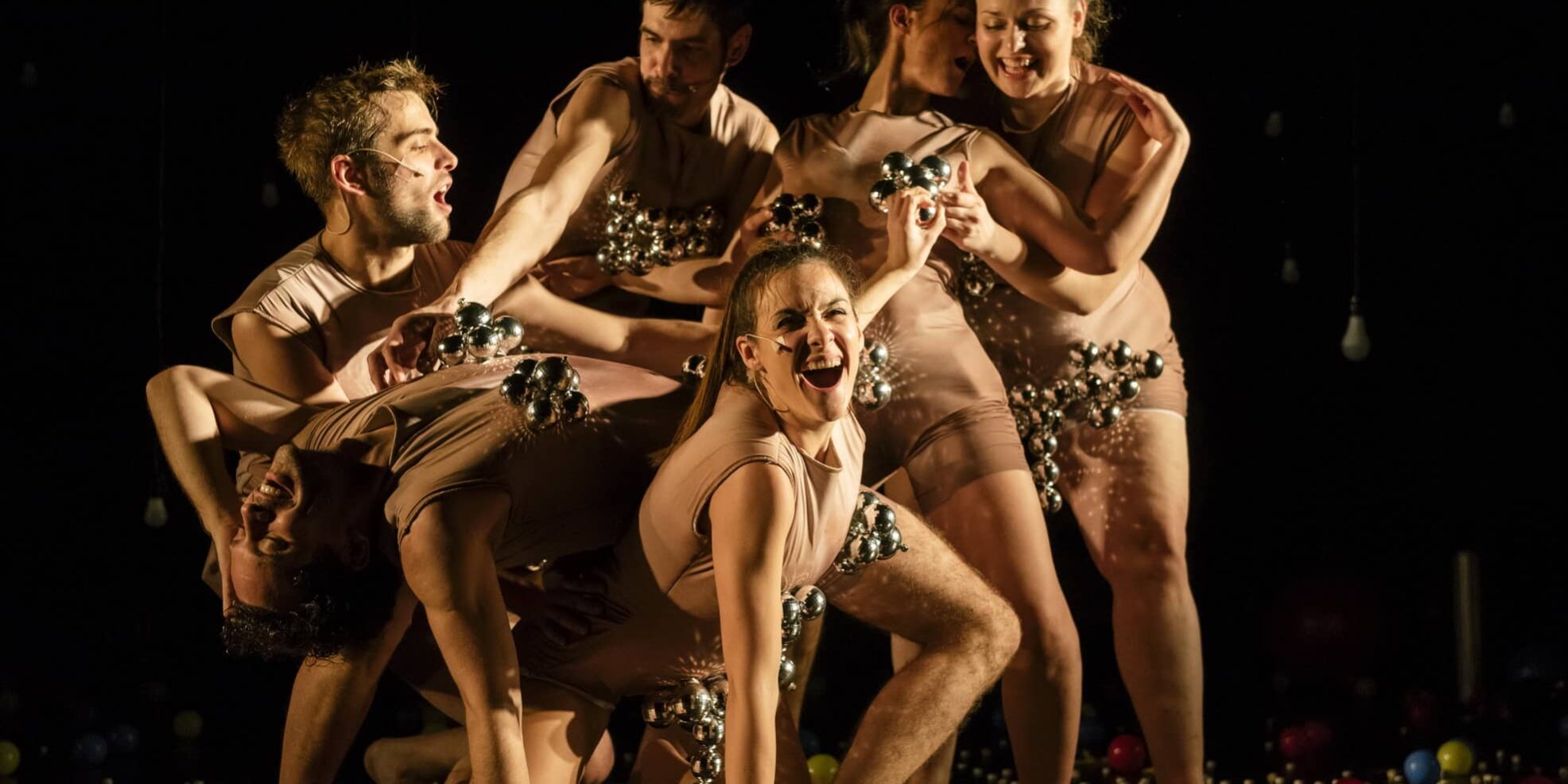The 67th Sterijino Pozorje – the most important national theater festival in Serbia – took place between 23rd May and 3rd June. Critics Borisav Matić and Andrej Čanji discuss the highs – and lows – of this year’s selection
BORISAV: Since 2017, Sterijino Pozorje has been a festival of national drama instead of national theatre. But the truth is that the majority of the best performances in the last five years have been based on foreign texts or not based on text at all – and all of those shows are now excluded from the festival.
Sterijino Pozorje tried to promote Serbian classics and contemporary plays with this current concept, but the production of such performances hasn’t increased or has increased only slightly. For me, the best thing that Pozorje is doing regarding the promotion of contemporary plays is its annual award for new playwrights where the awarded play is published and staged – but that’s an activity outside of the festival.
ANDREJ: I totally agree with you. I would add that the festival concept formed by Ivan Medenica was far better. There was a certain quota of productions based on contemporary drama that had to be met. In this way it promotes contemporary texts and compares them with productions based on foreign texts. It is especially important not to create a false image of the quality of productions based on national texts. That is the case this year. The awards were given to productions from a weak selection of show, and some of the categories, such as directing or the best production, were not exactly exemplary.
And that is why the audience and the jury of critics declared I’m that I’m not from the Zagreb Youth Theater, which is not in the competition selection, as the best production.
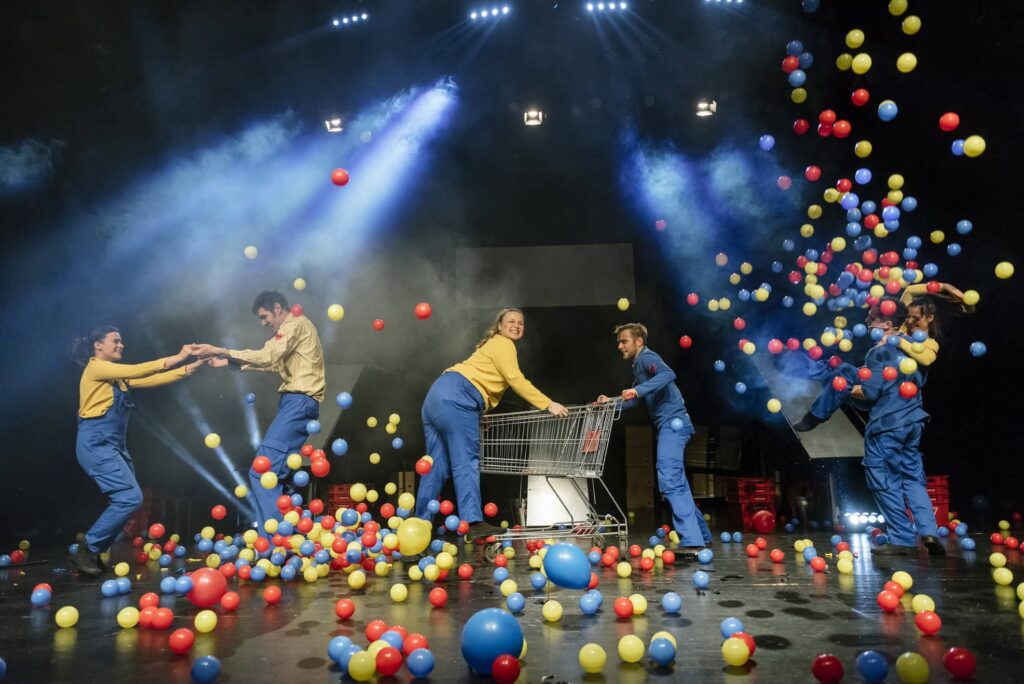
The Last Little Girls. Photo: Edvard Molnar
BORISAV: An example of your stance – The Last Little Girls from Kosztolayi Dezso Theatre in Subotica won the main awards for the best show, text (Maja Pelević), directing (Kokan Mladenović), ensemble and set design (Marija Kalabić).
The play is written in poetic, associative language, the music by Irena Popović is superb and the ensemble did a very skilful job in presenting the text by singing the whole time – but the show digresses into unintentional conservatism.
Pelević critiques the industry of surrogate motherhood, contraception, sex reassignment and other practices related to (mostly) female sex organs. She has a point in critiquing the industry that exploits these practices, but she ignores the emancipatory potential that these practices have, especially when they are outside capitalism. Thus, the show can be seen as single-minded in its advocating of biological essentialism – and even transphobic. Even if the show deserves the awards when put in the context of the selection, it still has many problems.
ANDREJ: Exactly. Within the selection of this year’s festival, it is the best performance, but in a broader context, it is not an example of an exceptional theatrical achievement because it shows a careless attitude towards meaning.
The same can be said of the second production, which was also directed by Kokan Mladenović. Favoritism is a comedy by the most famous Serbian comedian Branislav Nušić. It is a critique of a corrupt nepotistic society, which in Mladenović’s direction becomes a defeatist play. Since any resistance to the corrupt elite ends in defeat, the show, instead of mocking the regime or encouraging the citizens, pessimistically gives up honesty, courage and dignity.
I would say that the production of the National Theater The Years of Crows also stands out from the performances that move in the political spectrum as an accomplishment that sends a bad message. Do you agree?
BORISAV: Oh, do I! The Years of Crows is written and directed by Siniša Kovačević and it is his comeback to theatre after almost 20 years. It continues his oeuvre of epic plays that deal with big national themes. The play is set in Belgrade during and after the First World War. It is a historical play in the form of a melodrama but it’s clear that the author uses the historical narrative of Serbian suffering to promote intolerance towards neighbourly nations (in particular Croats, Slovenians and Germans).
It’s not so much a problem that war crimes in the show are exclusively committed by the Austro-Hungarian side because the First World War truly was a tale of their imperialist aggression and Serbian suffering. The problem is that, according to the show, the main villains are Croats and Slovenians. They are not even given a separate identity but singularly treated as “Germans”.
For example, no one can unravel if the main antagonist and monstrous war criminal Alojz Kavran is a Croat or a German – and it doesn’t matter because they are the same according to the logic of the show. The historical fact that Croats and Slovenians were also repressed in the Austro-Hungarian empire is completely ignored, as well as the fact that they were sent to die first on the front lines.
The creation of Yugoslavia is treated as treason to Serbian identity because the country also unified Croats and Slovenians. The show is also clever in its historical revisionism because it has several positive non-Serbian characters, so the author can point at them when accused of being nationalistic.
But there are also many aesthetic problems with this performance…
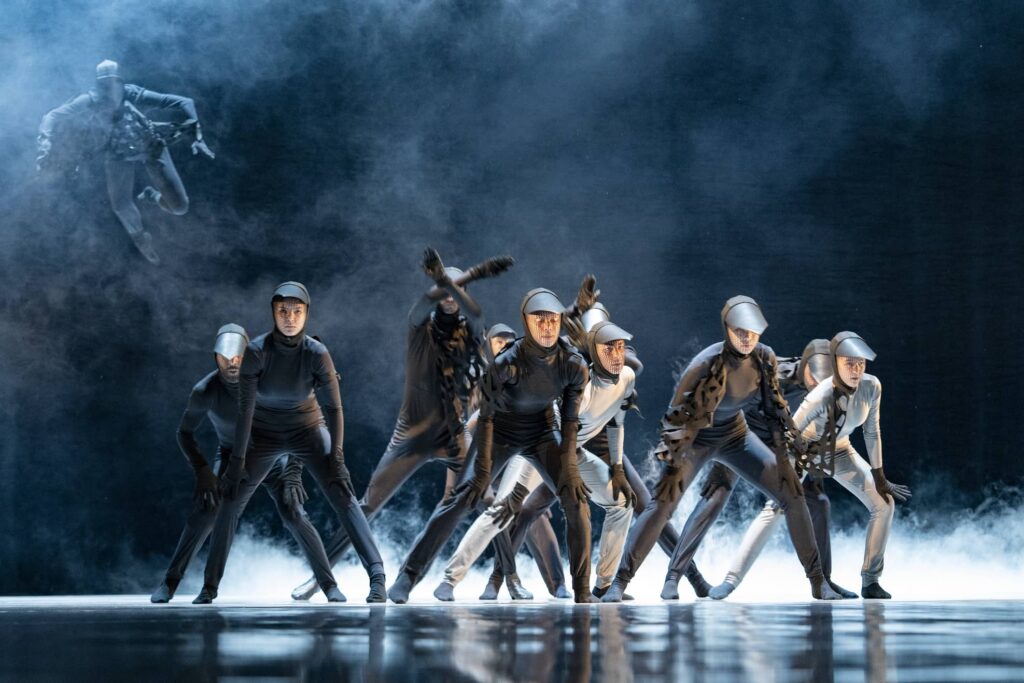
The Years of Crows_ Photo Milan Djakov and Andrea Leko
ANDREJ: The show has a lot of structural problems. The use of the ballet ensemble of the National Theater is one of the greatest. After each scene, ballet dancers in crow costumes have an intermezzo dance accompanied by several bars of the Radetzky March, which is whistled in a militant style like the one in The Bridge on the River Kwai.
Considering that the show lasts almost four hours and that there are 60 scenes, many of which last only a few seconds, there are countless such interludes. Repeating the same from the beginning to the end of the show without any elaboration or change is very unimaginative.
The dance of the crows themselves fluctuates between the movements of classical ballet and breakdance. Just as different dance styles are combined without any justification, crows without any reason get the function of scenography. For example, in some scenes, crows kneel and represent a table or a piano, and in other scenes, a real table is presented. I do not know why. It seems to me that director Siniša Kovačević was not concentrating during the process, so we got an arbitrary, reckless melodrama with plenty of pathetic scenes in which the same sad piano music accompanies every emotional, heartbreaking moment. It is an extremely outdated aesthetic that is ideologically very problematic.
BORISAV: I couldn’t agree more. But let’s move on to other performances. Rollercoaster from Atelje 212 is a comedy about intergenerational differences. Jelena Kajgo’s play focuses on the relationship between a conservative mother and a daughter who marries a Jewish man and moves to London.
The play extends to the near future, so the daughter and her family are heavily dependent on technology (they have a robot as a maid), she pretends to be Catholic so she can enrol her daughter into an elite kindergarten where they use a gender-neutral pronoun “they” for every child… The mother disagrees with this twisted liberal lifestyle – she is appalled that her daughter dismisses her Orthodox religion, she is shocked with society’s acceptance of same-sex relationships and on one occasion insists that black people should be called the “n-word” not African-Americans (I don’t know why the author uses this phrase throughout the show since the story is happening in Britain). And the mother is treated as the most sympathetic character – the majority of the audience rushes to her side. How do you see this situation?
ANDREJ: No surprises – I agree with you. I would also like to add that I have the impression that the authors believe that they are creating an important critique of modern society with this piece because, at the end, images of sad immigrant children are suddenly projected. But it is actually ordinary boulevard theater that presents superficial comic situations in the style and manner of the Belgrade bourgeois elite as a kind of deep revelation.
The acting is superb however, with the famous actress Dara Džokić brilliantly interpreting the character of the conservative grandmother and the extraordinary young actor Teodor Vinčić playing the role of the robot Šila.
The futuristic aspect of Rollercoaster somewhat obscures the fact that it is, at heart, a piece of easy content. If I’m mistaken that the authors of Rollercoaster consider their play to be politically engaged, I’m pretty sure the authors of performances like At The Eternal Tap, The Choosy Bride-To-Be, Stains, The Lustful Days of Hung Johnny and The Miracle in Šargan do not have such misconceptions. They have simply tried to create aesthetically pleasing performances. What is your opinion?
BORISAV: If we don’t talk broadly about politics (because every performance has its political significance) but about the specific form of politically engaged theatre, then I agree. Stains and The Lustful Days of Hung Johnny are both coming-of-age stories, although with different approaches to the genre.
Tijana Grumić wrote Stains focusing on the same motives as in her earlier plays – a girl is growing up with her simple but loving family, but in order to mature she must face the death of her loved ones. The show is touching from time to time, especially with Aleksandra Arizanović in the lead role and her character’s oscillation between childish excitement and mature observations on life. But the show is overshadowed by Grumić’s mannerisms – she used similar narratives several times in her previous plays and we have a feeling that we’re watching the same story in a different setting. Jug Djordjević’s directing doesn’t help as he used the same approach in directing Grumić’s play, Kepler 452-B – the actors are openly speaking to the audience, partly narrating the story, partly identifying with the play’s characters. The set design elements (Velimirka Damjanović) like microphones and a stage-within-a-stage are the same.
ANDREJ: What particularly bothers me here is that the play is constructed so that the family members die one by one as the narrative progresses. In relation to the previous pieces by Tijana Grumić, that seemed artificial to me. Instead of sympathy, it felt like a simple recycling of previously successful writing.
BORISAV: The Lustful Days of Hung Johnny has a different theatrical form – not only is it a dramatization of Filip Grujić’s novel (dramaturg Dimitrije Kokanov, director Jovana Tomić), it is a road-trip narrative about an extremely egoistic young man who travels half of Europe running away from self-recognition and the fact that the absence of his father hurts him.
Although this sounds like an intriguing premise, the dramatization is full of repetition and was confusing to people who haven’t read the novel. I also don’t know why the authors of the show chose to dramatize this novel since it’s full of eccentrically and un-subtly written characters, while Grujić’s second novel Tenant is much more mature.
But there is the performance At the Eternal Tap that’s also created by a young artistic team (director Sonja Petrović, dramaturg Mina Petrić). This is a show based on a classic play of the same name by Momčilo Nastasijević. What did you think about this show?
ANDREJ: At the Eternal Tap is for me primarily an old-fashioned piece. The sins of the ancestors is an old motive. If the belief in the metaphysical transmission of sin from generation to generation is not radically translated into a contemporary context, then apart from museum value, I don’t see the relevance of that play today.
I liked the acting, music and mise-en-scène in this performance, but I kept wondering: why am I watching this, in what way does this concern me? And the oscillations between realism and stylization were also unclear to me: realistic acting and collectively organized scenes with songs and symbolism; real apples and artificial flowers…
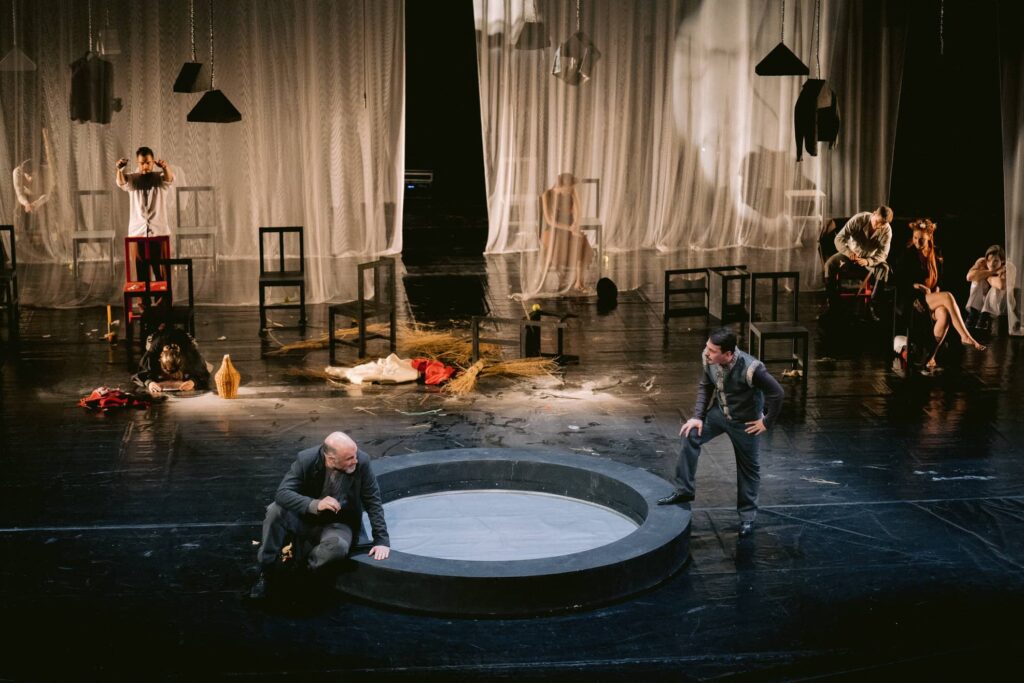
At The Eternal Tap. Photo: Vladimir Veličković
BORISAV: I would agree that At the Eternal Tap in Sonja Petrović’s directing has a museum value, but it also has a poetic quality. Nastasijević wrote the play with that intention. It is a valid choice to go to the theatre and enjoy the visual and musical poetry of the performance, but I needed more of these elements in the show. If the show that’s based on Nastasijević’s play is not a rhapsody of poetic images and sound, then it is stripped to its basis – an outdated narrative, as you noted. I think that this show is somewhere in the middle.
The Choosy Bride-to-Be has some formal similarities with At the Eternal Tap. It is a show based on a classic play by Kosta Trifković and it uses several traditional stylistic manners – from exaggerated comic acting and stereotypical portrayal of accents in Vojvodina, to elements of ballet and make-up that covers the whole face. The difference between the two shows is that At the Eternal Tap has a serious approach to its tragic theme, while the latter is comic. What did you think about The Choosy Bride-to-Be?
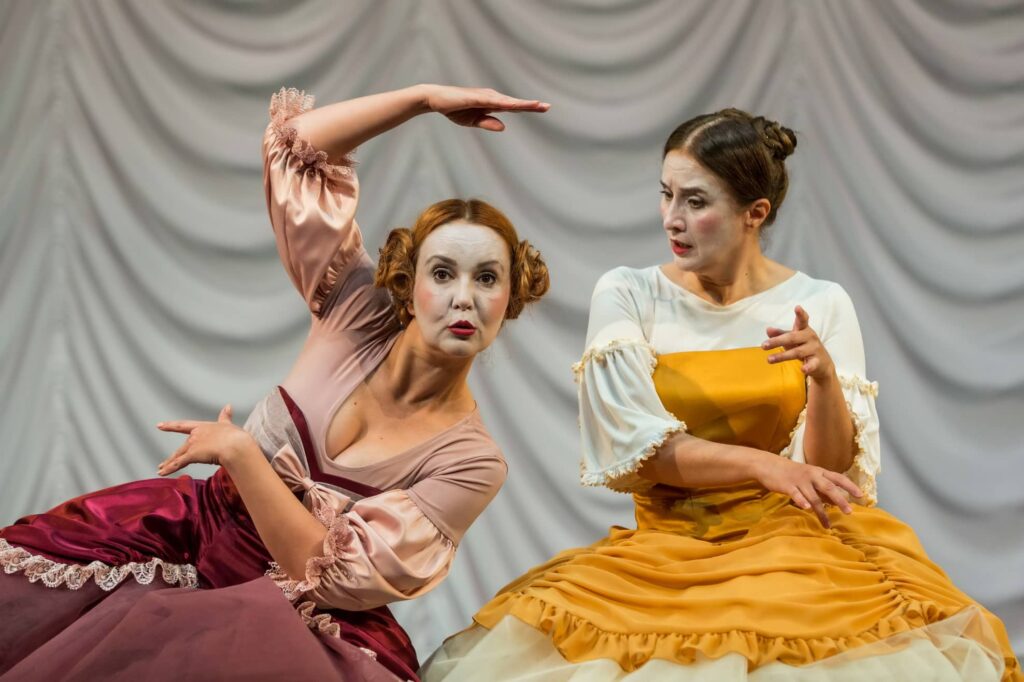
The Choosy Bride-to-Be. Photo: Igor Preradovic
ANDREJ: The Choosy Bride-to-Be is a parody of the mannerisms of Trifković’s dramaturgy and 19th century Vojvodina, just as you suggested. Although the show amused me, I can’t get away from the same impression I had about At the Eternal Tap – why would anyone decide to take a 19th-century piece and make fun of past forms?
I expected that the line of parody would develop into some sort of a commentary, but nothing happened. The scenography is marked by one anachronism: everything takes place in an empty space on a low platform decorated with crumpled plastic bottles. How is it addressed? How did it develop? It didn’t. It’s as if those bottles were there by accident. That is the essence of the performance. To entertain and confuse us a little.
Unfortunately, the situation is identical with the production The Miracle in Šargan. It is an extremely complex play by Ljubomir Simović, filled with a dense network of symbols. The famous director Jagoš Marković did not want to enter the intricate labyrinth of Simović’s text.
Instead, he focuses on humour, emotion and the fact that the scenography represents a flooded tavern, but the symbolism of the flood is not elaborated at all. Although the actors of the Yugoslav Drama Theater are excellent in their roles, it is precisely their roles that are a problem – a completely untapped potential reduced to a means for simple two-hour entertainment. Populist directing – a missed opportunity.
This negative attitude leads me to fear that we will be declared haters. Bora, is there anything you really liked?
BORISAV: Some have already declared us haters. But the majority of critics we spoke to also had a similar opinion of the festival.
The biggest asset of the selection, and also of the Serbian scene, is the diversity of theatrical forms and artistic approaches. I think that our discussion proves this, regardless of all the objections we made.
ANDREJ: I was stunned by the exceptional ensemble of the Kosztolányi Dezső Theater in The Last Little Girls, and I look forward to the themes of reproduction, contraception, invasive and violent research, and the difficulties of transgender people becoming relevant with this play. I was amazed by Todor Vinčić in the role of a robot in the play Rollercoaster.
In general, I was delighted with the quality of the acting. The actors are often the last bastion of defence against poorly designed and clumsily directed productions. This has been proven here in several performances. Although I’ve wondered why I watched At the Eternal Tap and The Choosy Bride-to-Be, I can’t say I haven’t enjoyed that purposeless purposiveness.
Finally, I would like to single out the institution of Sterijino Pozorje, which is an excellent organizer. Every year, despite numerous challenges, they manage to meet high organizational standards and meet everyone’s needs as much as possible.
BORISAV: Another positive thing is that Sterijino Pozorje not only accepts critiques but creates space for critical thought. Vlatko Ilić and Isidora Popović facilitated Round Tables so that everyone had the chance to explain their views on performances. The bulletin, as every year, published reviews by students of dramaturgy. And although there was some push-back from individual artists, Sterijino Pozorje continued to encourage theatre criticism.
ANDREJ: Sterijino Pozorje nurtures critical speech, even when the criticism is directed at the festival itself. This is a virtue that is extremely rare in our theatrical life because almost no one is able to tolerate criticism. This is what makes Pozorje the most important festival – it behaves with dignity and respect towards everyone and in spite of everything. I admire and respect that endlessly.
For more information about the festival, visit Pozorje.org.rs
Further reading: Ecocide is everywhere in Serbian Theatre, but Eco-Theatre remains on the fringes

